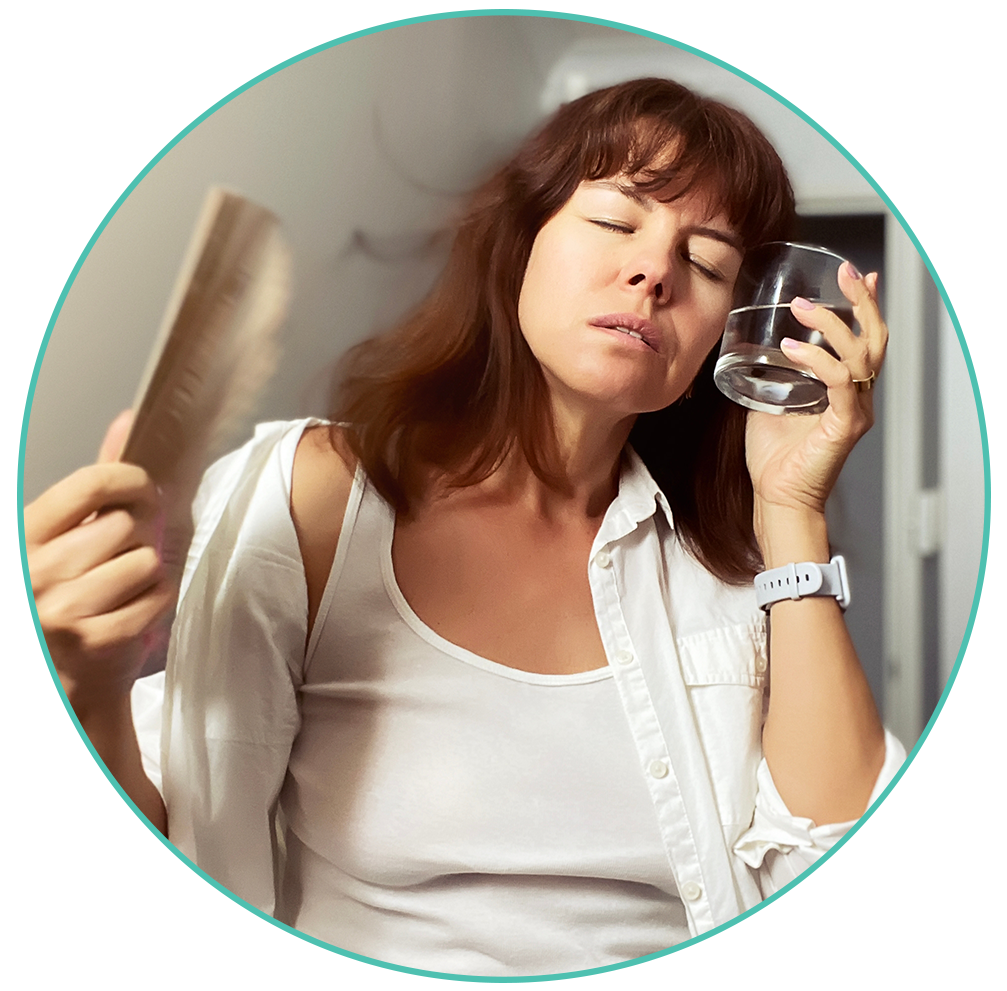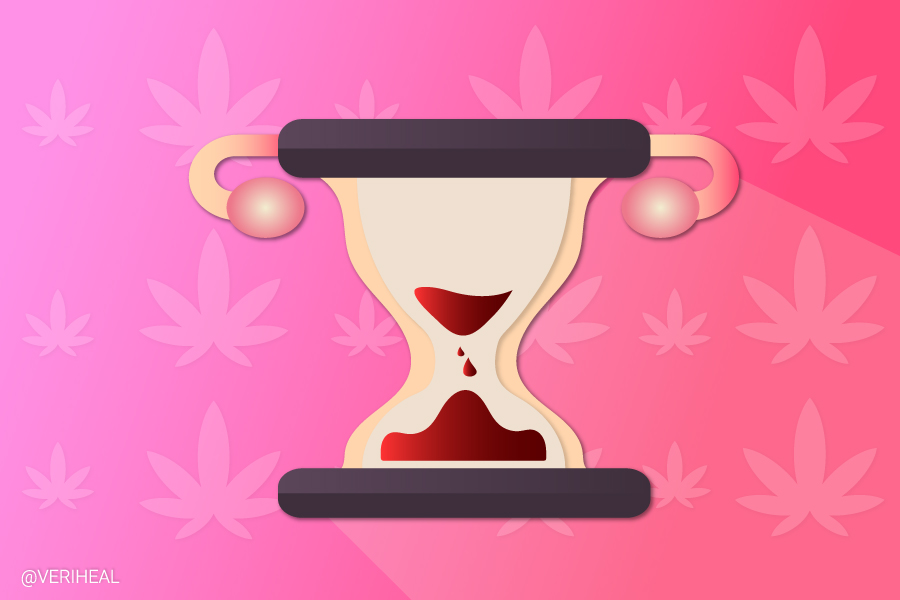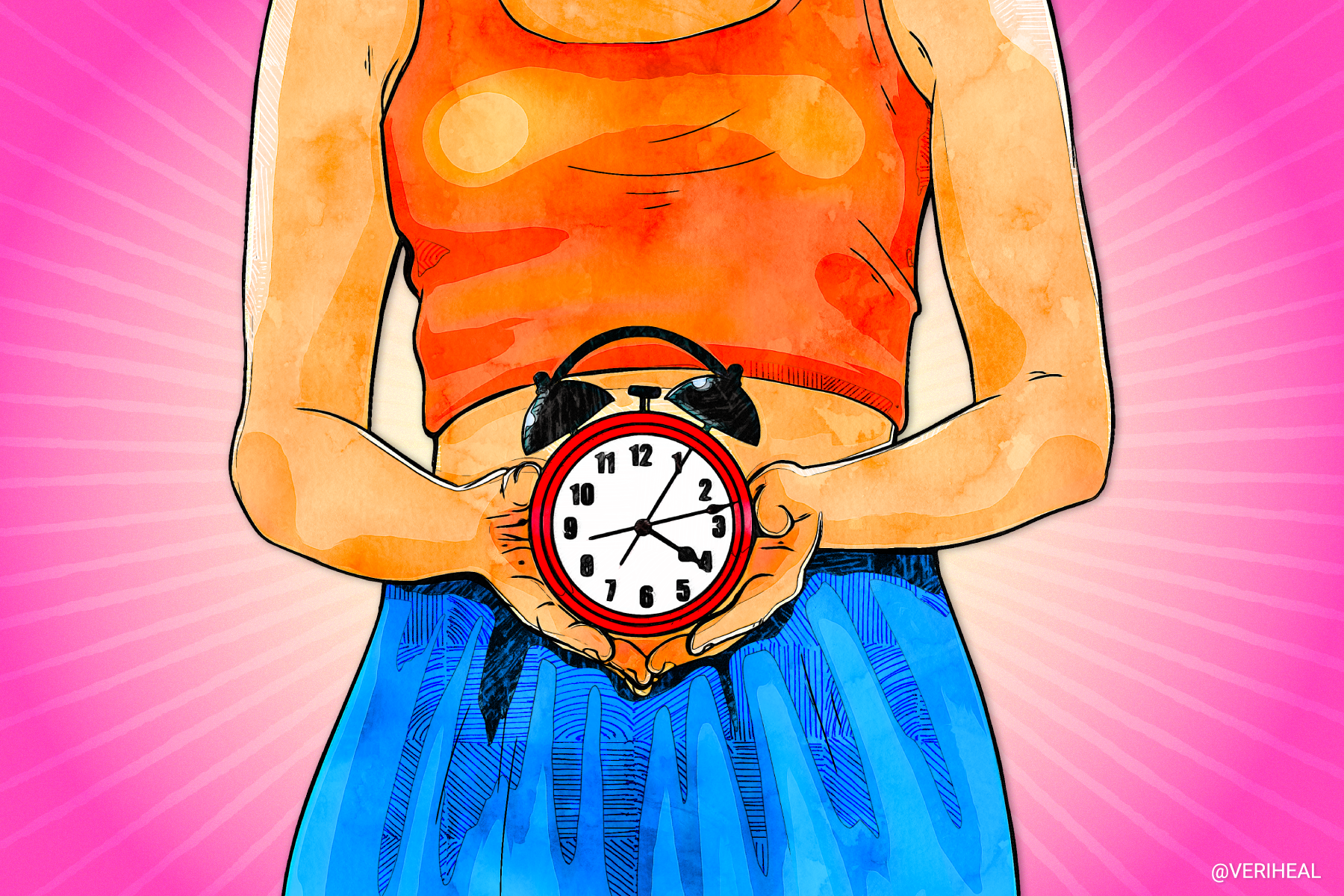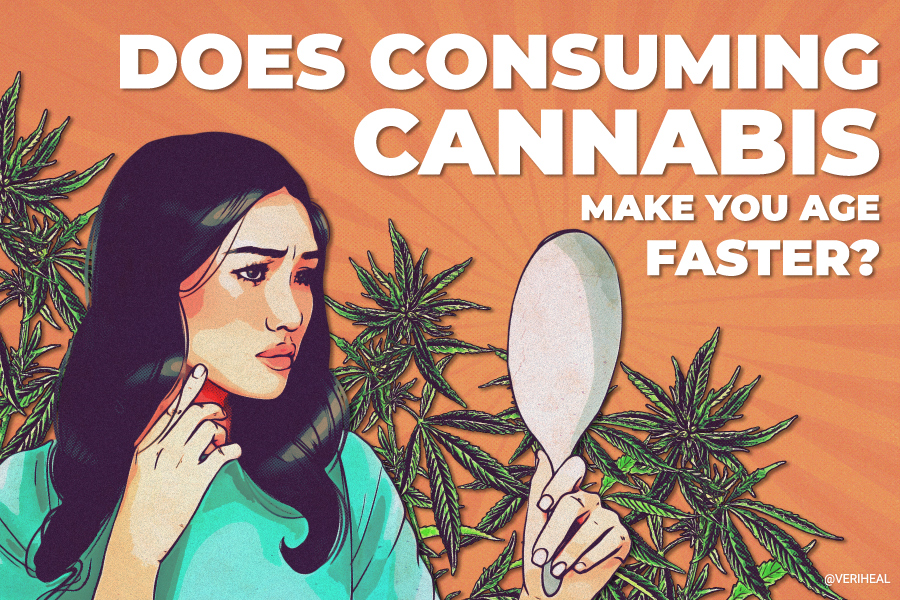Menopause and Medical Cannabis Treatment

- Signs, Symptoms, and Stages of Menopause
- Menopause Causes and Complications
- Traditional Menopause Treatments
- Marijuana and Menopause: Are Cannabinoids a Good Treatment Option?
- Marijuana and Menopause: What Products are Best for This Condition?
- Talk to Your Doctor About Menopause Treatments
Menopause is a natural process that marks the end of the menstrual cycle. It is diagnosed when a biological woman has gone 12 months without a menstrual period. The natural reproductive cycle ends during the ceasing of ovulation, meaning that fertility is no longer possible (17). A growing number of researchers are exploring the potential of medical marijuana to treat symptoms of menopause. Many knowledgeable physicians recommend medical marijuana and hemp-based cannabinoids to experience natural relief from menopause-associated symptoms.
According to the National Menopause Foundation, the menopausal transition usually occurs between ages 45 and 55 (8). However, the average age in the United States is 51. Approximately 1% of women experience menopause before age 40 — a condition known as premature menopause (11).
Typically, the menopausal transition (also called perimenopause) lasts for four years prior to the last period when menstrual periods become irregular. This precedes menopause which is the lack of menstruation for one year.
On average, postmenopausal symptoms can be as long as four years, but 1 in 10 biological women will have ongoing menopausal symptoms for 12 years after their last period. The overall duration of these stages depends on numerous lifestyle factors, including smoking, race, ethnicity, genetic or autoimmune conditions, ovary health, and the age of onset.
The menopausal transition may impact each individual differently. Not only does the body change in terms of the way it uses energy, but also, women may find themselves gaining weight more quickly because their hormones change. Changes in bone density, heart health, sexual health, the physical function of the vagina (e.g., dryness, atrophy), and body shape may also occur.
Signs, Symptoms, and Stages of Menopause
During the months or years leading up to menopause (perimenopause), the ovaries produce fluctuating levels of the essential hormones estrogen and progesterone. This disrupts the usual hormonal feedback loop between the brain and ovaries. As a result, several signs and symptoms begin to transpire and eventually cause menopause (13).
Some of the most common signs and symptoms of menopause include the following:
- Chills
- Dry skin
- Hot flashes
- Heart palpitations
- Elevated blood pressure
- Migraines
- Irregular periods
- Mood fluctuations
- Anxiety, depression, tension
- Night sweats
- Shrinking breasts
- Sleep disturbances
- Slow metabolism
- Thinning hair
- Vaginal dryness, itching, thinning
- Pain with sex, decreased libido (desire for sex)
- Urinary incontinence, frequency, urgency, and pain with urination
- Weight gain
A growing body of research suggests medical marijuana can treat symptoms of menopause, such as migraines, sleep disturbances, pain, and anxiety, among others. Symptom severity depends on which stage of menopause you are experiencing. There are four main stages of menopause, some of which may be divided into late stages as well:
- Premenopause – Healthcare professionals use this term or sometimes the term “reproductive stage” to describe the stage before menopause.
- Perimenopause – This menopausal transition stage marks when the ovaries gradually stop releasing eggs. On average, females will experience perimenopause for four years.
- The late menopausal transition lasts 1-3 of these years and is when vasomotor symptoms may begin for some (15).
- Menopause – This stage is confirmed when a biological woman has gone 12 consecutive months without having a period.
- Postmenopause – After having no period for more than one full year, life continues onto the postmenopausal stage.
- Early postmenopause continues for the next year and is when vasomotor symptoms (e.g., hot flashes, heart symptoms) are most likely to develop.
- After 3-6 years, late post-menopause is reached, where urogenital symptoms further develop and may persist.
Menopause: Causes and Complications
A common cause of menopause is naturally declining reproductive hormones. Midlife women approaching their late 30s will start producing less estrogen and progesterone. These hormones regulate menstruation, so fertility declines when produced in lesser amounts. Menstrual periods may become heavier, lighter, longer, or shorter when a woman is in her 40s.
Statistics suggest that most women enter menopause between the ages of 51 and 52 (15). According to MayoClinic, the average age at which the ovaries stop releasing eggs — meaning they have no more periods — is 51 (11). About 5% If menopause occurs before age 40, it is referred to as privacy ovarian insufficiency (POI), which affects approximately 1% of the general population. This is due to permanent ovarian failure, possibly associated with sex chromosome abnormalities (15).
Undergoing an oophorectomy, surgery that removes the ovaries will result in immediate menopause. After all, the ovaries play a vital role in producing hormones that regulate the menstrual cycle. Following an oophorectomy, periods will abruptly stop, and hot flashes may ensue. One study revealed that menopause occurred 1.8 years earlier in those who had undergone unilateral oophorectomy as opposed to when the two ovaries were left intact (18).
A surgery that removes the uterus but not the ovaries, better known as a hysterectomy, will not cause immediate menopause. Periods will stop, but the ovaries continue releasing eggs and producing estrogen and progesterone. This ongoing production keeps the brain’s hormones FSH (follicle-stimulating hormone) and LH (luteinizing hormone) in a low and steady state and prevents the onset of menopausal symptoms.
Cancer therapies, such as chemotherapy and radiation therapy, may also induce menopause. Menopause itself is not affected by radiation therapy. Still, ovarian or pituitary function may be impacted if radiation is directed at or near the ovaries or brain, which may result in menopause (9).
Since menstruation and fertility may be significantly impacted following chemotherapy, discussing any fertility concerns with your doctors and nurses before starting chemotherapy or radiation is essential. Sadly, these preferences are not always asked about or considered by your healthcare providers, so it is always important to advocate for yourself.
Once menopause has occurred, the risk of developing certain medical conditions tends to rise. Some examples of the common complications of menopause include:
- Heart and blood vessel (cardiovascular) disease –The risk of cardiovascular disease rises when estrogen levels sink. Consult a doctor about protecting the heart, reducing blood pressure, and managing cholesterol.
- Osteoporosis – Bone density may be lost during the first few years after menopause, thus increasing the risk of osteoporosis. Postmenopausal women who develop osteoporosis are at risk of fractures to their spine, hips, and wrists.
- Urinary incontinence – As the vaginal and urethral tissues lose elasticity, menopausal women may experience sudden, strong urges to urinate frequently. This is often followed by an involuntary loss of urine (urge incontinence), or urine loss that occurs after coughing, laughing, or performing strenuous movements like lifting (stress incontinence). Urinary tract infections may also occur more frequently in menopausal women.
- Sexual function – Menopause can take its toll on a woman’s sex life. Decreased moisture and loss of elasticity may cause discomfort during sexual intercourse. Some women also experience reduced sensation, bleeding, and lower libido. In such cases, vaginal estrogen treatment, moisturizers, and lubricants may be worthwhile.
- Weight gain – According to eBioMedicine researchers, metabolism slows during menopause (1). Because of this, maintaining a comfortable weight may be more difficult for menopausal women, many of whom will experience weight gain. The average weight gain in North American perimenopausal women is 5 pounds (2kg) over the menopause transition period (15).
Traditional Menopause Treatments
Birth control or hormonal therapy is then often advised as a means to try to ease resulting menopausal symptoms. Adding estrogen pills, creams, or combined hormones may help reduce symptoms like hot flashes, vaginal atrophy, and sleeping disturbances, plus prevent osteoporosis and related fractures – but they are also not risk-free.
Unopposed estrogen can increase the risk of uterine cancer, breast cancer, ovarian cancer, blood clots, stroke, and heart disease. These risks should be individually discussed with your provider and most likely only be used for a limited time and the lowest effective dose.
Selective estrogen receptor modulators (SERMs) may act on estrogen receptors without stimulating endometrial growth or increasing the risk of uterine cancer. They have similar protection against bone loss and hot flashes and promote healthy cholesterol levels.
Non-hormonal treatments like antidepressants may be used for a few months to help with menopause symptoms. These medications include SSRIs, SNRIs, gabapentin, and clonidine which could be helpful for vasomotor symptoms like hot flashes. Finally, there are osteoporosis-specific medicines and other supplements that may be considered. Each option must be discussed with your providers.
Marijuana and Menopause: Are Cannabinoids a Good Treatment Option?
One Harvard study investigated the use of cannabis in 131 women in the perimenopause stage and 127 women who had already experienced menopause (4). The study authors found that “nearly 79% endorsed it to alleviate menopause-related symptoms.” Of those women, 67% claimed that cannabis use reduced sleep disturbance, while “46% reported it helps improve mood and anxiety (4).”
This recent study featured in the journal menopause hypothesized that cannabis helps relieve menopause symptoms, such as anxiety, hot flashes, low sex drive, and sleep disturbance. The study explored the perks of using CBD and the mind-altering compound delta-9-tetrahydrocannabinol (THC) (4).
Since menopausal women often struggle with mood imbalance, cannabis’ mind-soothing properties could also prove helpful. One study from Washington State University delivered positive results, with cannabis “significantly” reducing anxiety, depression, and stress (3). Users reported a 50% reduction in depression and a 58% reduction in anxiety and stress post-consumption (3).
A 2016 study published in the Journal of Sexual Medicine revealed that more than two-thirds of women who consumed cannabis before intercourse felt it enhanced pleasure (10). Since menopause can cause vaginal dryness, cannabis-based medicines may promise to boost sex life during the menopausal stage of life (10).
On the contrary, a 2021 meta-analysis determined insufficient evidence to support the use of cannabis for perimenopausal and postmenopausal symptoms like mood, insomnia, and sexuality. As such, there will need to be larger and stronger studies to determine if there are any conclusive benefits of medical cannabis for menopause (14).
The Endocannabinoid System (ECS), Medical Marijuana, and Menopause
Research has shown that menopausal women can experience a lack of activity in the endocannabinoid system (ECS) that triggers many of the common effects of menopause (12).
The ECS is an active and complex cell signaling network. It comprises cannabinoid receptors, endocannabinoids, and enzymes that help regulate numerous functions in the human body.
Since the ECS was identified in 1988 by researchers Allyn Howlett and William Devane at Saint Louis University School of Medicine, researchers have been learning more about its influence on bodily functions (16).
Cannabis releases its effects via at least two types of receptors: CB1 and CB2 (cannabinoid) receptors. Endogenous cannabinoids and CB1 and CB2 receptors can be found in the ovaries, and their activity reaches a climax during ovulation. Ovulation does not occur in women who experience menopause.
Reduced endocannabinoid functioning may spark the onset of the unpleasant symptoms women experience during menopause. Levels of the hormone estrogen plummet during the hormonal shift.
Estrogen regulates an enzyme called FAAH, which breaks down endocannabinoids as part of the ECS (7). That being said, it’s likely that cannabis could serve as a tool for symptomatic relief.
CBD, among certain other minor cannabinoids, is known as a FAAH inhibitor and thus boosts endocannabinoid tone. In 2022, a preclinical study was done on mice with postmenopausal syndromes such as osteoporosis, insulin resistance, and inflammation. It was found that CBD treatment increased bone volume, improved glucose tolerance, and reduced inflammation (20).
Another 2022 preclinical study found that CBD reversed memory impairments in estrogen-deprived mice (2). This early research is important to help identify the possible ways cannabinoids may help with menopausal symptoms and complications.
Marijuana and Menopause: What Products Are Best for This Condition?
One of the main appeals associated with medical marijuana as a menopause treatment is the diversity of product options. Various cannabis preparations are available, with topical cannabinoid-infused solutions highly recommended for localized relief from cramps and dry skin.
Alternatively, women going through menopause may choose to consume edibles, pills, capsules, and tablets for longer-lasting effects. There’s also the option of using vapes and tinctures for fast-acting relief from the anxiety and fatigue that comes with menopause.
Talk to Your Doctor About Menopause Treatments
Females who are going through menopause ought to visit their doctor regularly for preventive healthcare assistance, as well as to discuss any medical concerns. Seeking professional medical aid is also advisable after menopause.
Colonoscopy, health screening tests, mammography, and triglyceride screening are recommended. A doctor might recommend other tests and exams, including thyroid testing and breast and pelvic exams. It’s essential to seek medical advice if bleeding from the vagina after menopause.
Complementary Treatments Worth Discussing with Your Doctor
A variety of home remedies and supplements are welcomed in cases of menopause. Some complementary and alternative treatments may include phytoestrogens (like soy, red clover, and cohosh), vitamin E, and omega-3 fatty acids. However, vitamin E and omega-3 fatty acids have not yet been shown to be better than placebo.
Randomized, controlled trials have evaluated the efficacy and short-term safety of some complementary and alternative medicine (CAM) therapies using soy products and herbs favored by menopausal women.
A 2016 systematic review and meta-analysis of 62 studies involving 6,653 females discovered that specific phytoestrogen supplementations, including soy isoflavones, reduced hot flashes and vaginal dryness (5).
A 2016 systematic review and meta-analysis found that red clover significantly improved vaginal dryness and vaginal atrophy (6). The researchers concluded that red clover consumption might reduce the frequency of hot flashes, particularly in menopausal females who endure five or more hot flashes per day.
A 2017 systematic review and meta-analysis of 47 randomized controlled trials involving 8,326 women with menopausal symptoms discovered that black cohosh reduced vasomotor symptoms more effectively than placebo (19). However, the symptomatic relief was no match for transdermal estradiol and progesterone.
To help with urinary incontinence, females may be advised to perform Kegel exercises to strengthen pelvic floor muscles. Hormone therapy may also benefit women who experience menopausal urinary tract and vaginal changes, but it comes with the abovementioned risks. Additionally, topical vaginal estrogen may help with symptom management in cases of incontinence.
Keep in mind that while the effects of cannabis products and other complementary medicines can prove beneficial for women’s health, it’s essential to continue using any medication(s) and treatments that your doctor prescribes.
Note: The content on this page is for informational purposes only and is not intended to be professional medical advice. Do not attempt to self-diagnose or prescribe treatment based on the information provided. Always consult a physician before deciding on the treatment of a medical condition.
- Bermingham, K. M., Linenberg, I., Hall, W. L., Kadé, K., Franks, P. W., Davies, R., Wolf, J., Hadjigeorgiou, G., Asnicar, F., Segata, N., Manson, J. A. E., Newson, L. R., Delahanty, L. M., Ordovas, J. M., Chan, A. T., Spector, T. D., Valdes, A. M., & Berry, S. E. (2022). Menopause is associated with postprandial metabolism, metabolic health and lifestyle: The zoe predict study. EBioMedicine, 85, 104303. https://www.thelancet.com/journals/ebiom/article/PIIS2352-3964(22)00485-6/fulltext
- Corrê, M. da, de Freitas, B. S., Machado, G. D., Pires, V. N., Bromberg, E., Hallak, J. E. C., Zuardi, A. W., Crippa, J. A., & Schröder, N. (2022). Cannabidiol reverses memory impairments and activates components of the AKT/gsk3β pathway in an experimental model of estrogen depletion. Behavioural Brain Research, 417, 113555. https://www.sciencedirect.com/science/article/abs/pii/S0166432821004435?via%3Dihub
- Cuttler, C., Spradlin, A., & McLaughlin, R. J. (2018). A naturalistic examination of the perceived effects of cannabis on negative affect. Journal of Affective Disorders, 235, 198–205. https://pubmed.ncbi.nlm.nih.gov/29656267/
- Dahlgren, M. K., El-Abboud, C., Lambros, A. M., Sagar, K. A., Smith, R. T., & Gruber, S. A. (2022). A survey of medical cannabis use during perimenopause and postmenopause. Menopause, 29(9), 1028–1036. https://journals.lww.com/menopausejournal/Fulltext/2022/09000/A_survey_of_medical_cannabis_use_during.6.aspx
- Franco, O. H., Chowdhury, R., Troup, J., Voortman, T., Kunutsor, S., Kavousi, M., Oliver-Williams, C., & Muka, T. (2016). Use of plant-based therapies and menopausal symptoms. JAMA, 315(23), 2554. https://pubmed.ncbi.nlm.nih.gov/27327802/
- Ghazanfarpour, M., Sadeghi, R., Roudsari, R. L., Khorsand, I., Khadivzadeh, T., & Muoio, B. (2015). Red Clover for treatment of hot flashes and menopausal symptoms: A systematic review and meta-analysis. Journal of Obstetrics and Gynaecology, 36(3), 301–311. https://pubmed.ncbi.nlm.nih.gov/26471215/
- Hill, M. N., Karacabeyli, E. S., & Gorzalka, B. B. (2007). Estrogen recruits the endocannabinoid system to modulate emotionality. Psychoneuroendocrinology, 32(4), 350–357. https://pubmed.ncbi.nlm.nih.gov/17391861/
- Home. National Menopause Foundation. (2020, July 12). Retrieved February 14, 2023, from https://nationalmenopausefoundation.org/
- How cancer and cancer treatment can affect fertility in females. American Cancer Society. (n.d.). Retrieved February 14, 2023, from https://www.cancer.org/treatment/treatments-and-side-effects/physical-side-effects/fertility-and-sexual-side-effects/fertility-and-women-with-cancer/how-cancer-treatments-affect-fertility.html
- Lynn, B., Miller, C., Thompson, J., & Campian, E. C. (2017). The relationship between marijuana use prior to sex and sexual function in women. The Journal of Sexual Medicine, 14(1). https://www.jsm.jsexmed.org/article/S1743-6095(16)30726-3/fulltext
- Mayo Foundation for Medical Education and Research. (2022, December 17). Menopause. Mayo Clinic. Retrieved February 14, 2023, from https://www.mayoclinic.org/diseases-conditions/menopause/symptoms-causes/syc-20353397
- McMurray, T. (2021, December 8). Medical Marijuana & Menopause. CannaMD. Retrieved February 14, 2023, from https://www.cannamd.com/medical-marijuana-menopause/#:~:text=Endogenous%20cannabinoids%20and%20CB1%20and%20CB2%20receptors%20are,to%20many%20of%20the%20common%20effects%20of%20menopause
- MediLexicon International. (n.d.). Perimenopause and ovary pain: Causes, symptoms, and treatments. Medical News Today. Retrieved February 14, 2023, from https://www.medicalnewstoday.com/articles/322040
- Mejia-Gomez, J., Phung, N., Philippopoulos, E., Murphy, K. E., & Wolfman, W. (2021). The impact of cannabis use on vasomotor symptoms, mood, insomnia and sexuality in perimenopausal and Postmenopausal women: A systematic review. Climacteric, 24(6), 572–576. https://pubmed.ncbi.nlm.nih.gov/33759668/
- Menopause – StatPearls – NCBI Bookshelf. (n.d.). Retrieved February 14, 2023, from https://www.ncbi.nlm.nih.gov/books/NBK507826/
- One of your body’s best kept secrets. NeuroScience (en-US). (n.d.). Retrieved February 14, 2023, from https://www.neuroscienceinc.com/news/2020/one-of-your-bodys-best-kept-secrets
- Person. (2020, January 13). What you need to know about menopause. Healthline. Retrieved February 14, 2023, from https://www.healthline.com/health/menopause
- Rosendahl, M., Simonsen, M. K., & Kjer, J. J. (2017). The influence of unilateral oophorectomy on the age of Menopause. Climacteric, 20(6), 540–544. https://pubmed.ncbi.nlm.nih.gov/28933974/
- Sarri, G., Pedder, H., Dias, S., Guo, Y., & Lumsden, M. A. (2017). Vasomotor symptoms resulting from natural menopause: A systematic review and network meta-analysis of treatment effects from the National Institute for Health and Care Excellence guideline on Menopause. BJOG: An International Journal of Obstetrics & Gynaecology, 124(10), 1514–1523. https://pubmed.ncbi.nlm.nih.gov/28276200/
- Sui, K., Tveter, K. M., Bawagan, F. G., Buckendahl, P., Martinez, S. A., Jaffri, Z. H., MacDonell, A. T., Wu, Y., Duran, R. M., Shapses, S. A., & Roopchand, D. E. (2022). Cannabidiol-treated ovariectomized mice show improved glucose, energy, and bone metabolism with a bloom in lactobacillus. Frontiers in Pharmacology, 13. https://www.frontiersin.org/articles/10.3389/fphar.2022.900667/full

















